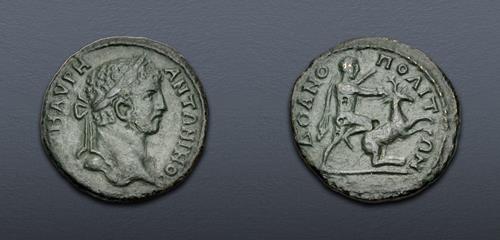|
THRACE, Hadrianopolis. Caracalla. AD 198-217. Æ Tetrassarion (27mm, 11.11 g, 12h). Fourth Labor of Hercules – The Cerynean Hind. Laureate head right / Hercules right, bringing down the Ceryneian Hind. Jurukova 268 (V152/R197); Varbanov 3540. Green surfaces, some smoothing. VF.
From the Skillman Collection. Ex Classical Numismatic Group Electronic Auction 499 (1 September 2021), lot 340.
Hercules, made temporarily insane by the goddess Hera, murdered his wife and children. Once recovered, and distressed by his actions, Hercules consulted the Delphic Oracle to find a means of expiating his sin. As a punishment, Apollo replied that the hero would have to serve his cousin Eurystheus, the king Tiryns, a man whom Hercules despised, for a period of twelve years. Because Eurystheus also hated Hercules, he devised a series of ten feats of such difficulty that they would be either insurmountable, or Hercules would die in the attempt. Because Hercules received assistance in completing two of the tasks, Eurystheus added two more. Each labor became more fantastic, and eventually Hercules was compelled to break the bonds of the supernatural in order to complete his task. Once he accomplished the Labors, Hercules was absolved of his guilt, and preceded to perform many other heroic feats.
Angered to find that Hercules had successfully completed the previous two Labors, Eurystheus ordered him to capture the Cerynean Hind, a creature sacred to Artemis that was renowned for its incredible speed. The king hoped that Hercules, by capturing this animal, would incur the wrath of that goddess. Since it could elude even the swiftest arrow, Hercules devised a cunning plan. He chased it across the earth for a whole year, and when it stopped to drink, Hercules rendered it lame by shooting it with one of his few unpoisoned arrows. Another version of the story relates that he captured the animal when it was unable to run any farther. As he was returning to Mycenae, Hercules encountered Artemis and Apollo. He begged the goddess for forgiveness, explaining that he had to catch it as part of his punishment, but he promised to return it. Artemis forgave him, foiling Eurystheus' plan. However, Eurystheus was not to be undone. Wishing to include the Hind in his menagerie, he ordered Hercules to release it to him. Since he had promised Artemis to return the Hind to her, Hercules devised a stratagem: he agreed to hand the Hind over on the condition that Eurystheus himself came out and took it from him. The King came out, but the moment Heracles let the hind go, it sprinted away. Hercules answered that Eurystheus had not been quick enough.
Closing Date and Time: 17 July 2024 at 11:36:40 ET.
All winning bids are subject to a 20% buyer’s fee.
|
